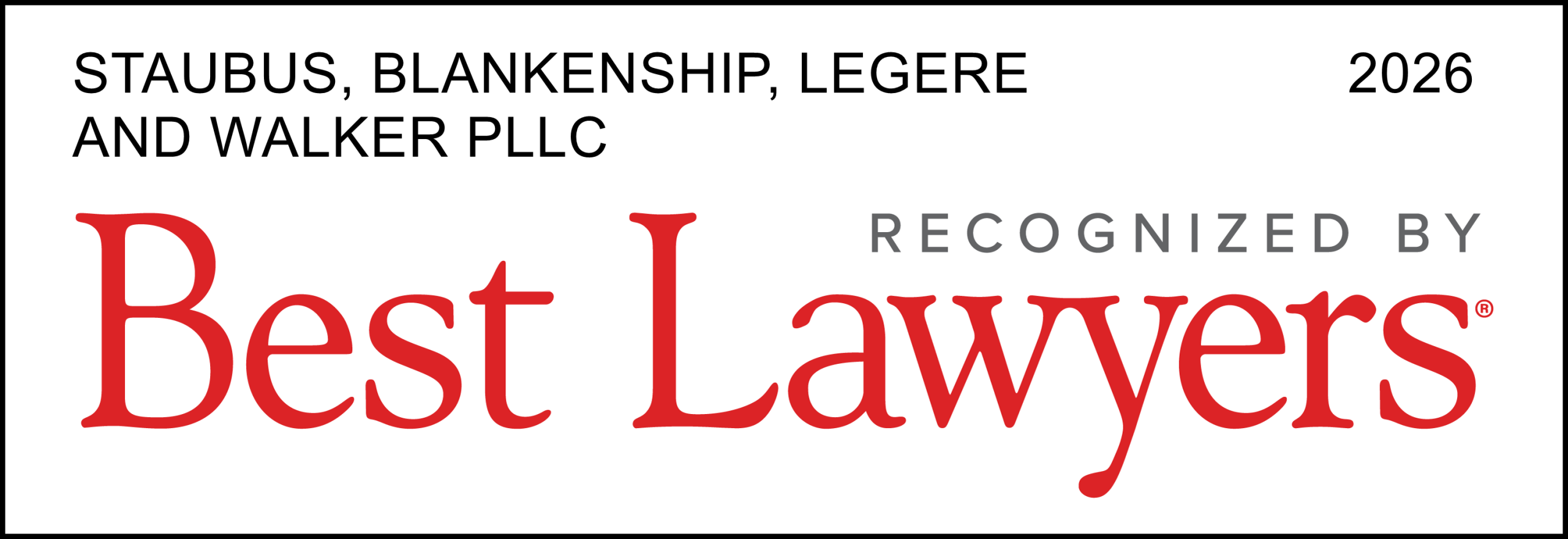The experienced litigators at Staubus, Blankenship, Legere and Walker PLLC are available to discuss your estate, trust or guardianship dispute, explore your legal options, and to take swift and decisive action to protect your rights and your inheritance. We have decades of experience in advising will and trust beneficiaries of their rights, as well executors and individual and corporate trustees of their duties and avenues to protect and defend themselves in high stakes litigation.
We invite you to contact Staubus, Blankenship, Legere and Walker PLLC today about scheduling a consultation. Call (214) 833-0100 or complete this online chat form. We welcome the opportunity to assist you.
Decades of Knowledge and Experience in Estate Litigation

Decades of Knowledge and Experience in Estate Litigation
The Dallas estate litigation attorneys/probate litigation firm of Staubus, Blankenship, Legere and Walker PLLC provides legal representation for probate, guardianship, and trust litigation, as well as estate planning and asset protection. We help people safeguard their estates and protect their rights during estate and trust disputes.
Our knowledge and skills have been developed through years of dedicated practice in probate courts. This allows us to handle both routine, uncontested probate matters, as well as conflicts, including high stakes estate, trust, and guardianship lawsuits.
The innovative techniques of our estate planning practice minimize income, gift, estate, and generation-skipping taxes. We also handle succession planning for closely-held businesses and asset protection planning for professionals, high net-worth individuals, and families seeking to protect their assets from the risk of loss.
Staubus, Blankenship, Legere and Walker PLLC gives the legal support you need to move your probate or estate planning process forward smoothly and efficiently. Get in touch with us today.
Why Choose Staubus, Blankenship, Legere and Walker PLLC
Experienced guidance to protect your interests and assets
Staubus, Blankenship, Legere and Walker PLLC's attorneys are highly experienced estate and trust litigators who focus solely on lawsuits involving probate, trusts, and guardianships. With over 100 combined years of legal experience, our compilation of specific skills, knowledge, experience, and resources are brought to each case for innovative and results-orientated representation. Our AV rating is the highest available from the prominent law firm rating service, Martindale Hubbell, offering the benefits of a large firm but in a boutique atmosphere with dedicated, personal service to all of our clients.
The firm has been ranked by Best Lawyers as a Tier One Best Law Firm in Dallas/Fort Worth for trust and estate litigation.
We can help you better understand what our firm has to offer when you schedule a consultation, and we discuss your situation and answer questions you have.
In addition to Dallas, our attorneys also serve Plano and Richardson. Learn More

Accolades
Staubus, Blankenship, Legere and Walker PLLC has been ranked by Best Lawyers as a Tier One Best Law Firm in Dallas/Fort Worth for trust and estate litigation, and P. Keith Staubus and Julie K. Blankenship have been selected as Best Lawyers in America, all peer-selected recognitions.
Some of the attorneys at Staubus, Blankenship, Legere and Walker PLLC have also earned special recognition from Thomson Reuters as Super Lawyers and Rising Stars. These special distinctions are awarded after extensive review, both by peers and independent parties.
P. Keith Staubus was recognized as a Super Lawyer in 2005 and 2009 - 2025.
Joseph E. Legere was recognized as a Rising Star from 2010 - 2012 and 2014 - 2015, and as a Super Lawyer in 2020 through 2025
Kelly C. Walker was recognized as a Rising Star in 2011, 2012, and then from 2014 - 2017, and as a Super Lawyer in 2021 through 2025.
P. Keith Staubus has also been recognized by D Magazine as a Best Lawyer in Dallas 2025 in probate, trusts, and estates.
What is Probate Litigation
Probate is the legal process of distributing the assets of a deceased person. Any debts are paid off first, and then the remaining assets are distributed to the beficiaries under the decedent's will, or the heirs at law if there was no will. This can be straightforward, but in some cases, it can be controversial. Probate litigation occurs when these disagreements result in someone filing a lawsuit. These lawsuits often occur when:
- There is a question about the legal meaning and effect of certain statements in a will.
- There is concern that the will is not valid.
- There is a belief that executors or administrators have not fulfilled their responsibilities correctly.
- There is a dispute concerning right of survivorship or pay on death designations.
- There is a dispute over validity of retirement benefits designations.
- There is a dispute over the validity of life insurance beneficiary designations.
- There is a dispute over who are the heirs-at-law (including claims of illegitimate children).
- There is a dispute over community property issues.
- There is a claim of common law marriage.
- A creditor files a claim against the estate.
Law firms that handle probate cases only a few times a year often do not have the experience or resources necessary to adequately assist clients in complex probate litigation. The attorneys at Staubus, Blankenship, Legere and Walker PLLC have a solid foundation in probate litigation and have handled numerous types of disputes in and out of the courtroom. Find out why so many people choose our team to represent them when it matters most.

What Should I Expect

Information you need for probate and estate matters
Staubus, Blankenship, Legere and Walker PLLC is committed to protecting your interests, so we will discuss all the details of your circumstances and ask for specific documentation. This means getting to know you, your family, and your financial situation, so we can explore every option on your behalf. We will form a proposal for you to consider what steps to take. Once we agree on a plan, we will implement it to achieve your goals.
If your situation includes a dispute, we endeavor to come to a resolution through mediation or reconciliation whenever possible. If a lawsuit is your best option, we will aggressively pursue a litigation plan that strongly advocates for you.
Here are some of the items you may be asked to provide during a probate or estate planning process:
- List of assets owned (personal property, vehicles, property)
- Bank account statements
- Retirement and investment account statements
- Businesses formation documents
- Death certificate (if applicable)
- Estate planning documents (wills, powers of attorney, trusts, etc.)
Frequent Asked Questions
Estate planning is the arrangement of transferring a person’s assets and property after their death. The estate plan you create may consist of cars, homes, life insurance, assets, real estate, jewelry, and other types of personal property. When you create an estate plan, you must sign it in front of a notary public.
Even if you don’t have many assets, it’s still a good idea to create an estate plan, so that loved ones won’t argue over who gets what when you pass away. Your estate plan will ensure everything you own goes to specified parties and doesn’t end up in the wrong hands.
Typically, those with extensive or complex assets will hire an estate planning lawyer to help draft their will. Many use a will to divide personal property, such as a home, among their family members. When you’re preparing your will, you need to make sure you meet specific legal requirements. Having a witness present when you’re signing the documents is crucial.
Of course, it’s possible to draft a will on your own, especially if you don’t have significant assets to leave behind. However, hiring an estate planning lawyer can ensure that your documents comply with current law, and that everything gets divided among your family the way you want, so there’s no confusion.
A power of attorney is a legal document giving power to one person (an agent or attorney-in-fact) to act on your behalf if you become incapacitated. When you create a power of attorney, you can designate a specific person and decide how much authority they will have.
An attorney-in-fact would maintain records of all decisions made on your behalf. Some decisions could include recommending a guardian for dependents or minor children and financial decisions. They could also make decisions about healthcare.
If you allow your power of attorney the authority to stop, give, or withhold medical treatment, you can leave instructions on which services you want and don’t want, when to stop life-saving measures, and when to cease specific treatments.
It’s devastating to lose a loved one, and the last thing anyone wants to do is handle their affairs. However, you must ensure property and assets go to the right people, and everyone follows their final wishes.
The first thing you should do when your loved one passes away is to request a copy of a legal pronouncement of death. You should also notify close friends and family of their death. If necessary, arrange for the supervision of dependents or minor children. You’ll also be able to find instructions on how to move forward with their plans from their will or trust.
A trust is a document that places your assets into a trust fund to transfer to a beneficiary upon your death. Most people will create a trust to speed up the process of settling their estate. You can also protect your assets, reduce taxes, and prevent probate.
With a trust, you’re not only able to control who your assets go to but also how the money gets disbursed. This is especially beneficial if the person you’re leaving money to doesn’t know how to save and spend properly. You can create a payment schedule with a specified amount paid to them on a weekly or monthly basis, rather than as a lump sum.

What planning we can sue for?
When a loved one dies, and the execution of their estate plan begins, many disputes can arise among family members. Despite the decedent's creation of a good estate plan, problems can occur if a power of attorney doesn’t perform their duties or someone’s unhappy with the division and distribution of assets.
The most common disputes estate lawyers see include:
Bad fiduciary selection
A majority of disputes arise when the power of attorney, executor, or trustee doesn’t correctly perform their duties when their loved one dies. That failure is called a breach of fiduciary duty. Common breaches include:
- Failure to file tax returns
- Using assets for personal benefit
- Failure to provide tax and accounting information to beneficiaries
- Dividing and distributing assets improperly
To avoid these issues, you should ensure your loved one chooses the right fiduciary during the process of planning their estate. Careful selection can ensure there’s no breach of duty, and they act in the deceased’s best interest.
Will or Trust Contest
When someone contests a trust or will, it’s either because they don’t think it’s legally valid or believe someone influenced the creator into making decisions they didn’t want to make.
To be legal, the creator of the will must sign under specific circumstances and in a particular manner. In Texas, the person must meet the following requirements:
- Be at least 18 years of age;
- Be of sound mind, meaning they’re able to make decisions and understand the consequences of a will;
- Sign the will themselves;
- Signature of at least two witnesses; and
- List at least one beneficiary.
Improper execution of a will is less common than undue influence. Many will argue that the creator of the trust or will made their decisions because of another party. The person accused of undue influence could be a friend, caregiver, professional advisor, or family member.
Distribution of property
Sometimes conflicts will arise when the creator of a will or trust intends to leave someone their property but dies before they can change their estate plan to reflect that decision. Other instances create conflicts when beneficiaries believe the distribution of property is unfair or inequitable.

How should I handle estate law disputes?
If you come across the disputes listed above or any other types of disputes, there are options for resolving them. The remedy you choose will depend on the particular conflict and the people involved.
- Remove the executor: If there’s a problem with the executor of the estate, you might need to replace or remove them. Finding a replacement can be difficult, especially finding one that all parties are happy with. However, it’s the best decision to ensure everyone is satisfied with how the estate gets handled. The best choice would be a neutral third party who doesn’t hold any biases.
- Litigation: To litigate a dispute, you must be an inheritor and have sufficient grounds for pursuing a lawsuit. Most people will litigate if they believe there was an improper distribution of the property or suffered a financial loss because someone mismanaged the estate.
- Mediation: This is the best option for individuals who want to settle the issues amicably, timely, and inexpensively. Mediations usually bring about quick results and cost less than litigation. You also have complete control over the outcome because there isn’t a judge or jury involved.
Latest News
01 January 2026
When a loved one passes away, their executor holds significant…
Read more About Executor Misconduct Attorney in Texas: Warning Signs and How to Take Action22 December 2025
Estate disputes don't always start with a contested will. Many…
22 November 2025
When a family member needs a guardian, the process should…
We're here to help you
Leveraging our experience and integrity, we will guide you in achieving what is best for you and your family. You can rely on the experience and integrity of Staubus, Blankenship, Legere and Walker PLLC to navigate the best legal course of action for your situation. Put our experience to work for you.













